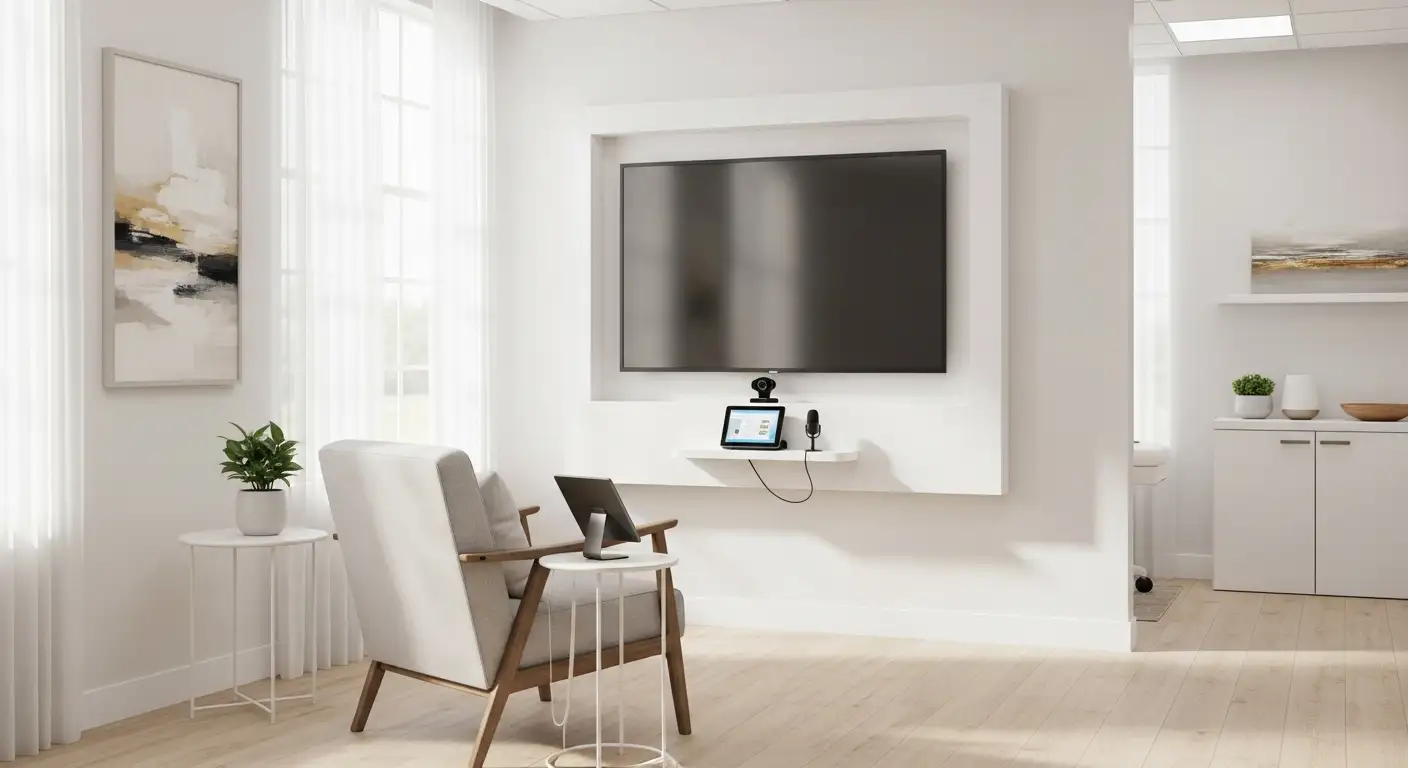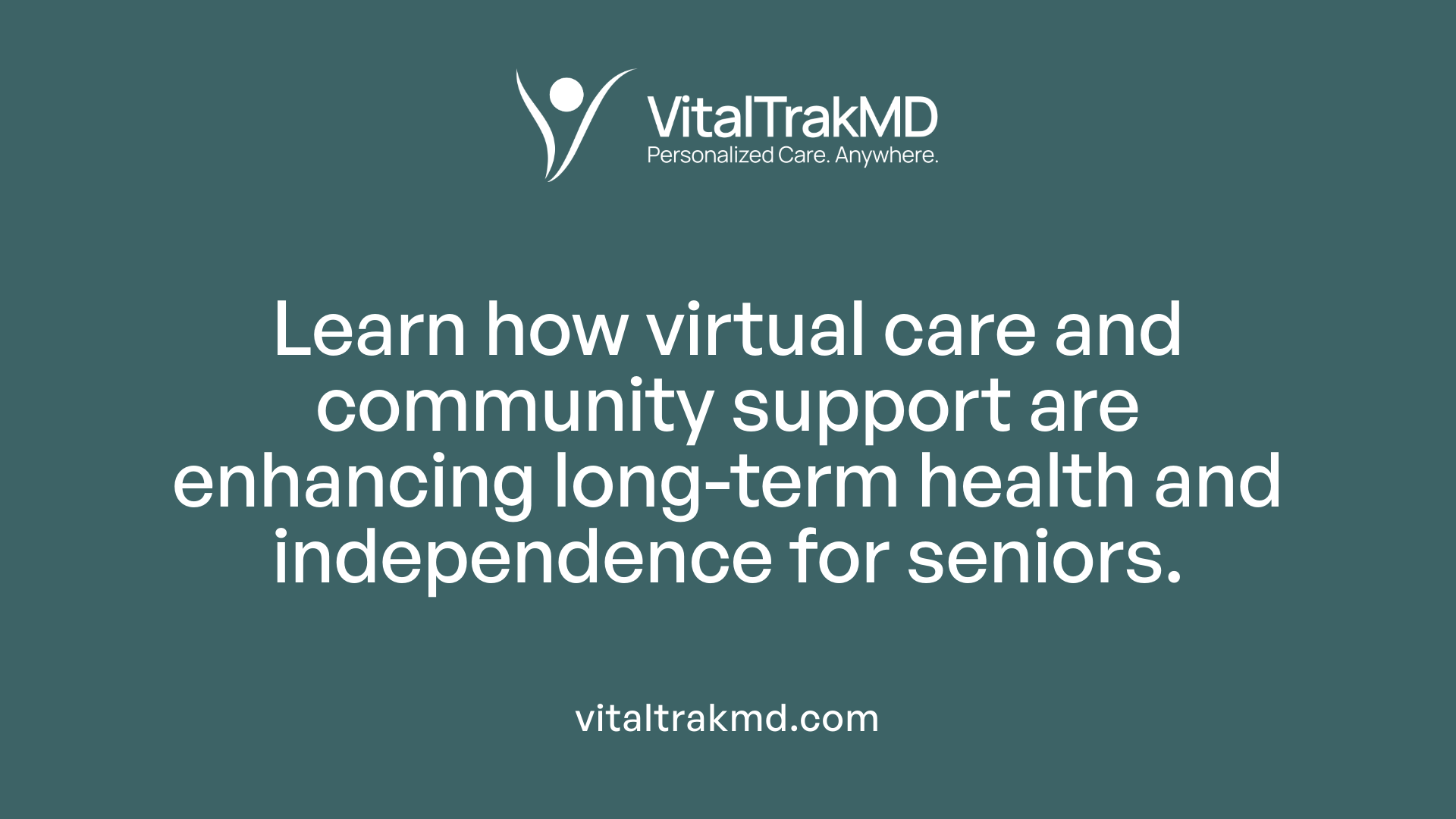How Consistent Virtual Check-Ins Improve Senior Sleep Health

The Growing Role of Telehealth in Senior Wellness
As the senior population faces unique health challenges, maintaining quality sleep is vital for overall well-being. Consistent virtual check-ins have emerged as a transformative approach, leveraging telehealth to provide comprehensive wellness assessments and ongoing support. This article explores how these virtual engagements improve senior sleep health by fostering preventive care, enhancing access, and promoting sustainable wellness habits.
Comprehensive Virtual Wellness Assessments: A Holistic Approach to Senior Sleep Health

What are the key components of effective wellness programs?
Effective wellness programs include several essential elements to support overall health and early intervention. These components are nutrition education, regular physical activity, mental health support, stress management, and consistent health screenings. Together, these elements help improve well-being and detect potential health concerns early.
What is the role of physical and mental health checks in identifying sleep issues?
Physical and mental health assessments are crucial for uncovering sleep problems in seniors. Physical checks assess underlying conditions affecting sleep, while mental health evaluations detect stress, anxiety, or depression that may disrupt rest. These evaluations are integral parts of wellness programs aimed at improving sleep and overall quality of life.
Why are medication reviews and fall risk assessments important?
Medication reviews ensure seniors are not on medications that negatively impact sleep or cause side effects like dizziness, which increase fall risk. Fall risk assessments physically evaluate balance and mobility to prevent accidents during nighttime activities, directly protecting seniors' safety and promoting restful sleep.
How do communication evaluations fit into holistic wellness?
Communication assessments help identify difficulties seniors might experience in expressing health concerns or following medical advice. Improving communication skills facilitates better healthcare outcomes, ensures adherence to recommendations, and strengthens relationships between seniors and healthcare providers.
This interdisciplinary approach, as exemplified by the University of Rhode Island’s collaborative program, empowers seniors with comprehensive health guidance remotely. It enhances preventive care and promotes holistic wellness by integrating physical, mental, and social health dimensions into virtual assessments.
Designing Weight and Lifestyle Management Programs to Support Sleep Quality in Seniors

How can weight loss programs be designed to promote sustainable results?
Weight loss programs for seniors should prioritize gradual, steady weight reduction rather than rapid loss. Sustainable approaches emphasize balanced nutrition that includes a wide variety of fruits, vegetables, whole grains, and healthy fats. Encouraging manageable physical activities suited to individual capabilities helps improve metabolism and promotes better sleep patterns.
Behavior modification techniques play an important role in supporting ongoing lifestyle changes. Seniors benefit from professional guidance combined with peer or family support to remain motivated and adhere to healthier habits over time. These sustained changes not only aid in weight management but also contribute to improved sleep quality by reducing factors like sleep apnea and discomfort.
Balanced nutrition and gradual lifestyle changes
Programs need to avoid drastic diets that can disrupt metabolism or nutrient intake, which may negatively affect sleep. Instead, gradual adjustments in meal timing and composition that stabilize blood sugar can enhance nighttime rest. Adequate hydration and limiting stimulants such as caffeine later in the day also support better sleep hygiene.
Behavior modification and ongoing support systems
Implementation of behavior modification strategies — including goal setting, self-monitoring, and positive reinforcement — can help seniors adopt healthier routines steadily. Support groups, counseling, or frequent check-ins with health professionals encourage accountability and emotional well-being.
Realistic health goals for seniors
Setting achievable and measurable goals that consider physical limitations and chronic conditions is crucial. These realistic targets encourage continued progress without causing frustration or injury, contributing to overall wellness that encompasses improved sleep quality.
| Element | Approach | Benefit for Sleep Quality |
|---|---|---|
| Nutrition | Balanced, gradual changes | Reduces sleep disturbances |
| Physical Activity | Manageable, consistent exercise | Enhances sleep duration and quality |
| Behavior Modification | Goal-setting, support, monitoring | Promotes adherence and reduces stress |
| Realistic Goal Setting | Individualized, achievable targets | Prevents discouragement and promotes rest |
This holistic design ensures that weight and lifestyle management programs not only foster sustainable weight loss in seniors but also support improved sleep, ultimately enhancing their overall health and quality of life.
The Role of Care Programs and Telehealth in Supporting Senior Sleep and Long-Term Wellness

What role do care programs play in supporting long-term health and wellness?
Care programs are vital in helping seniors maintain independence and enhance long-term wellness. They offer comprehensive health resources and services tailored to prevent complications and promote aging in place. By providing home-based and community support, these programs help seniors proactively manage their health conditions, improving aspects such as sleep quality and overall wellness.
How does early planning and community support enhance senior wellness?
Early engagement with care programs connects seniors to beneficial services well before health issues escalate. Community-based supports offer ongoing monitoring and social interaction, which contribute to mental health and better sleep patterns. Planning ahead ensures timely interventions, reducing the risks of emergency hospital visits.
How are virtual check-ins integrated into senior care programs?
Virtual health check-ins have become a cornerstone of modern care programs. These remote assessments using laptops, tablets, or smartphones allow seniors to receive regular evaluations of physical and mental health, medication reviews, and fall risk assessments from the comfort of their homes. This model not only increases accessibility but also encourages ongoing wellness monitoring.
What are the benefits of telehealth for managing chronic conditions and medication?
Telehealth facilitates continuous management of chronic diseases by enabling routine remote appointments, prescription refills, and health status check-ins. This seamless communication helps seniors adhere to medication regimens and detect potential issues early, reducing complications and enhancing sleep and daily functioning.
How does remote monitoring and telehealth reduce hospital visits?
Remote monitoring through telehealth detects early signs of health deterioration, allowing timely interventions that prevent emergency room visits and hospitalizations. This approach lowers healthcare costs while ensuring seniors receive consistent care. Additionally, virtual consultations minimize exposure to infections, particularly important for vulnerable populations during times like the COVID-19 pandemic.
These integrated care programs, empowered by telehealth, thereby promote not only physical health but also the social and mental well-being of seniors, supporting their long-term wellness and quality of life.
Enhanced Accessibility and Social Connection through Virtual Health Check-Ins

How Do Virtual Consultations Improve Access for Mobility-Limited Seniors?
Virtual health check-ins provide a convenient alternative for seniors who face mobility challenges or live in remote locations. By using devices like laptops, tablets, or smartphones, seniors can consult healthcare professionals from their homes. This approach removes barriers related to transportation and physical access, enabling timely health assessments and care management that might otherwise be difficult to obtain.
How Does Remote Involvement of Family Members and Specialists Enhance Care?
Virtual consultations offer a unique advantage by allowing family members, specialists, and previous physicians to participate in appointments regardless of their physical location. This inclusion supports comprehensive, collaborative care tailored to the senior's needs. It fosters shared decision-making and enhances communication among all parties involved, ultimately improving health outcomes.
What Social Bonds Are Formed Between Students and Seniors in Virtual Programs?
Programs like the one organized by the University of Rhode Island's health colleges facilitate meaningful interactions between health students and seniors. These virtual check-ins go beyond clinical assessments; they create opportunities for social connection and shared learning experiences. Such relationships not only reduce feelings of isolation among seniors but also enrich students' understanding of patient-centered care.
How Do Virtual Check-Ins Reduce Exposure to Infectious Diseases?
Especially highlighted during the COVID-19 pandemic, virtual health consultations significantly reduce the risk of exposure to infectious diseases. By eliminating the need for in-person visits, seniors are protected from crowded waiting rooms and healthcare facilities, minimizing their vulnerability to illnesses. This safety benefit remains a vital factor in encouraging telehealth adoption.
What Are the Efficiency and Affordability Benefits of Telehealth?
Telemedicine optimizes healthcare delivery by cutting down travel and waiting times, which saves time for both patients and providers. Additionally, it can lower costs by reducing overhead for providers and decreasing unnecessary emergency visits. Sometimes covered by insurance or employers, telehealth makes healthcare more affordable and accessible for seniors, supporting ongoing wellness and better health management.
The Future of Telehealth: Technology Advancements Shaping Senior Sleep and Wellness Care

How Are Emerging Technologies Enhancing Telehealth for Seniors?
The future of telehealth holds promising advancements driven by technologies such as artificial intelligence (AI), machine learning, virtual reality, and wearable remote monitoring devices. These innovations enable more personalized and dynamic care for seniors by analyzing health data in real time and adapting interventions to individual needs.
What Role Does Personalized Remote Monitoring Play?
Wearable devices allow continuous tracking of vital signs, sleep patterns, and activity levels. This ongoing monitoring helps detect early signs of health issues, enabling quick intervention before conditions worsen. Personalized data supports tailored care plans that improve wellness and manage chronic illnesses more effectively.
How Are Virtual Disease Management and Mental Health Services Improving Senior Care?
Telehealth platforms are expanding to include comprehensive virtual management of chronic diseases and mental health support. Seniors can access counseling, therapy, and specialist consultations remotely, which enhances care continuity and reduces the burden of travel. These services are crucial for managing sleep disorders and psychological well-being.
What Are the Potential Impacts on Sleep Health and Chronic Condition Management?
Advanced telehealth tools can track sleep quality, identify disruptions, and integrate this information with broader health data. This integration provides a holistic view necessary for managing sleep-related issues commonly associated with chronic conditions. Improved monitoring and timely adjustments via telecare are expected to enhance overall sleep health and chronic disease outcomes for seniors.
Through these technological advancements, telehealth is set to transform senior care by making it more accessible, personalized, and effective, directly impacting their sleep and overall wellness.
Transforming Senior Sleep Health with Consistent Virtual Engagements
Consistent virtual check-ins represent a powerful tool in enhancing senior sleep health by integrating comprehensive wellness assessments, sustainable lifestyle management, and supportive care strategies. Leveraging telehealth expands accessibility while promoting social connection and proactive health management. As technology continues to advance, personalized virtual care will increasingly foster better sleep quality and overall wellness, empowering seniors to age healthfully and independently.
References
- URI Health Sciences, Pharmacy, Nursing students conduct ...
- Virtual Health Check-Ins for Mobile Professionals
- How Telemedicine is Revolutionizing Senior Care
- 5 steps to sustainable weight loss
- What Is Long-Term Care? - National Institute on Aging - NIH
- 10 Things About Long-Term Services and Supports (LTSS)
- Long Term Care | HFS
Recent articles
Want to Feel Better and Live Healthier?
Join hundreds of patients taking control of their health with personalized care that fits their life – not the other way around.
Rated 4.8/5 by 32+ customers







